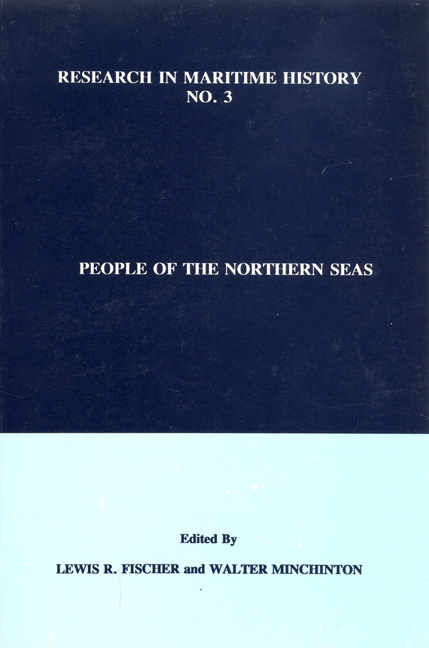Book contents
- Frontmatter
- Contents
- About the Editors
- Contributors
- General Introduction
- “Une Petite Republique” in Southwestern Newfoundland: The Limits of Imperial Authority in a Remote Maritime Environment”
- “Changes in Aleut Communities Following Russian Contact”
- “Five Years Before the Mast: Observations on the Conditions of Maritime Labour in Finland and Elsewhere”
- “Expressions of Longing, Sources of Anxiety? The Significance of Contacts with Home for Finnish Sailors in London and Hull in the Late Nineteenth Century”
- “Death of a Merchant”
- “St. Petersburg's Bills of Exchange in the Russian Economy of the Eighteenth Century”
- “Shipowners and Iron Sailing Ships: The First Twenty Years, 1838-1857”
- “The Growth of Norwegian Shipbroking: The Practices of Fearnley and Eger as a Case Study, 1869-1914”
- “Captain John Deane: Mercenary, Diplomat and Spy”
- “Her Majesty's Coastguard”
- “Coastal Life, ‘Nordic Culture’ and Nation State: Reflections on the Formation of the Nation State and Maritime History”
General Introduction
- Frontmatter
- Contents
- About the Editors
- Contributors
- General Introduction
- “Une Petite Republique” in Southwestern Newfoundland: The Limits of Imperial Authority in a Remote Maritime Environment”
- “Changes in Aleut Communities Following Russian Contact”
- “Five Years Before the Mast: Observations on the Conditions of Maritime Labour in Finland and Elsewhere”
- “Expressions of Longing, Sources of Anxiety? The Significance of Contacts with Home for Finnish Sailors in London and Hull in the Late Nineteenth Century”
- “Death of a Merchant”
- “St. Petersburg's Bills of Exchange in the Russian Economy of the Eighteenth Century”
- “Shipowners and Iron Sailing Ships: The First Twenty Years, 1838-1857”
- “The Growth of Norwegian Shipbroking: The Practices of Fearnley and Eger as a Case Study, 1869-1914”
- “Captain John Deane: Mercenary, Diplomat and Spy”
- “Her Majesty's Coastguard”
- “Coastal Life, ‘Nordic Culture’ and Nation State: Reflections on the Formation of the Nation State and Maritime History”
Summary
For too long the most common definition of maritime history encompassed little beyond the study of ships. Obscured in the mists were not only those who manned the vessels, such as mariners and fishermen, but also a host of others who both facilitated and benefitted from seagoing activities. This myopia often relegated maritime issues to the scholarly periphery, since much of what was accepted as maritime history was both antiquarian and untouched by the types of intellectual debates that animated the larger discipline. This collection of eleven articles reflects an emerging trend toward situating maritime questions within the context of broader historical concerns. Nonetheless, we make no claims for the uniqueness of this approach. Indeed, over the past two decades a plethora of monographs and essays have tried to broaden the focus of maritime history, and since 1989 the International Journal of Maritime History has also been devoted to this task.
This volume focuses upon some of the “people of the northern seas.” Collectively, the contributions convey some of the flavour and diversity of maritime life along the littoral of the world's northern seas in the seventeenth, eighteenth and nineteenth centuries. While the majority deal with Europe, we have also included essays on the north Pacific and eastern North America. The papers were originally presented at a conference sponsored by the Association for the History of the Northern Seas in conjunction with the city of Kotka, Finland, in August 1992. This was the ninth Baltic seminar of the Kotka Provincial Museum and the sixth conference of the Association for the History of the Northern Seas. A variety of factors, including space, precluded the publication of all the papers, but the eleven selected for inclusion in this issue of Research in Maritime History are broad in scope. This diversity also characterizes the contributors, who come from Canada, the United States, Denmark, Finland, Norway, Sweden, and Great Britain. Here then is a collection concerned with the lives and activities of people of the northern seas whose lives were governed to some extent by the diurnal round of the moon and the tides, factors which affected the ebb and flow of human activity on the margins of the oceans.
- Type
- Chapter
- Information
- People of the Northern Seas , pp. vii - xviPublisher: Liverpool University PressPrint publication year: 1992



